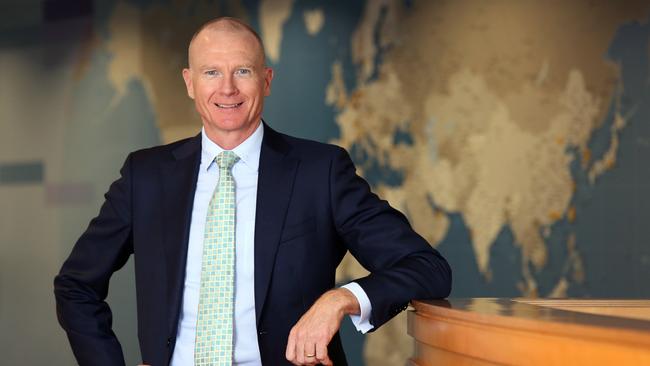Cochlear stays course on China, ignores political brawling
Hearing implant giant Cochlear is pressing ahead with its China’s plant despite increasing tensions between Canberra and Beijing.

Hearing implant giant Cochlear is pressing ahead with its China’s plant despite increasing tensions between Canberra and Beijing, chief executive Dig Howitt says.
The company has spent $50m on the factory, which is about to be commissioned and will serve more than 50,000 customers it has restored hearing to in China.
Mr Howitt’s comments came as Cochlear’s shares soared 9 per cent to $207.37 after the company delivered better-than-expected earnings and splashed cash to shareholders, raising its half-year dividend 35 per cent and flagging a beefier full-year payout.
The company’s revenue jumped 10 per cent to $815.3m in the six months to December 31, with emerging markets – including China – the standout, with sales up 30 per cent following a bounce back from pandemic-related surgery deferrals.
Mr Howitt said the company was committed to China for the “long term”. This is despite heightened political brawling between Scott Morrison and Anthony Albanese, with the Prime Minister accusing the Labor leader of being “soft” on China in the face of hostilities with Beijing.
“We provide a very important product or service into China. We’re helping thousands of Chinese children hear and a few adults now as well,” Mr Howitt said.
“We’re providing that lifetime support to more than 50,000 people in China. Again, most are children. We have got the factory in China and we’re in the process of commissioning that factory.
“We want to stay obviously a bit separate from what’s going on in the short term. We’ve been in China for over 25 years now. We think very long term and that’s always the perspective we have on our business.”
Cochlear is also looking to create more Australian jobs if parliament passes the much anticipated “patent box” legislation, which would almost halve the corporate tax rate – currently 30 per cent – on the profits of products developed and produced in Australia.
The company currently has a global workforce of 4000, half of whom are based in Australia.
“For a number of years, we target a net profit margin, and anything up to that margin we reinvest in our business and that reinvestment goes into R&D or into growing our revenue … that investment will create jobs in Australia,” Mr Howitt said.
“Countries around the world compete for companies like us because we create high-paying jobs, like manufacturing jobs and R&D jobs. There’s some hot international competition and Australia is not competitive with 30 per cent.
“We see this as a very important piece of legislation to ensure the international competitiveness of Australia’s medtech sector.”
More than 20 countries around the world, including the UK, Switzerland and France, offer similar incentives to the “patent box”, which gets its name from the box on an income tax form that businesses check if they qualify.
Cochlear generated an underlying net profit margin of 19 per cent for the period, ahead of its 18 per cent longer-term target.
Overall net profit slid 28 per cent to $169.3m. But on an underlying basis – stripping out $12m in gains from its innovation fund – net profit leapt 26 per cent to $158m. The company will pay a half-year dividend of $1.55 a share on April 21 – representing a payout ratio of 65 per cent of underlying net profit and 35 per cent lift on the previous corresponding period.
“We expect the dividend payout to be around 70 per cent for the full year, in line with our target payout,” Mr Howitt said.
Cochlear expects to deliver a full-year net profit of $265m-$285m, a 13-22 per cent increase on 2021’s underlying net profit.
But Mr Howitt warned of a “more material disruption from Covid”, which did not form part of the current guidance.
“Despite the ongoing disruption to surgeries caused by Covid, we continue to be confident of the resilience of our hearing-implant business over the longer term,” he said. “Second-half trading to date is tracking in line with the first half, with continuing intermittent Covid-related hospital or region-specific elective surgery restrictions. Operating theatre capacity is also being affected by hospital staffing shortages, an issue that emerged during the second quarter, and which may impact capacity (this) half.
Wilson analysts Shane Storey and Melissa Benson said Cochlear’s full-year profit guidance “looks conservative if major market demand is exceeding pre-Covid levels”.
“Each successive Covid exacerbation/recovery sub-cycle appears to be less impactful,” the pair wrote in a note to investors.
“Cochlear’s target NPAT margin of just under 18 per cent (FY basis) implies that our 2H22 revenue forecast (about 10% growth) shouldn’t change. It may also signal a lower 2H margin – possibly a mix effect with services growth moderating and increased … support for planned product launches.”







To join the conversation, please log in. Don't have an account? Register
Join the conversation, you are commenting as Logout